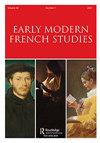‘Est-ce vivre?’ The Politics of Living in La Boétie and Montaigne
IF 0.2
3区 历史学
Q2 HISTORY
引用次数: 0
Abstract
This article explores Étienne La Boétie's discussion of the unfree life, with and against Montaigne's accounts of life in the Essais. In De la servitude volontaire, La Boétie responds to writing on life in his source texts, such as Seneca's ‘On the Brevity of Life’: the life of servitude is almost antithetical to any ‘good life’, and indeed is scarcely life at all. Giorgio Agamben's concept of ‘bare life’ and Orlando Patterson's characterisation of slavery as ‘social death’ elucidate La Boétie's characterisations of the deprived life in servitude. Montaigne's differently weighted reflections on painful, reduced, or tyrannised lives at the end of Book II allow that lives that are ‘less than good’ (not least his own, while suffering ‘subjection’ to kidney stones) may nonetheless be worth living. These approaches are part of the broader interest in early modern political thought in minimal definitions of the good life, and/or negative accounts of life.“是否生活乐趣?《生活在波黑和蒙田的政治
本文探讨Étienne La bosamtie对不自由生活的讨论,并与蒙田在《随笔》中对生活的描述相比较。在De la servitude volontaire中,la bosamtie回应了他的原始文本中关于生活的写作,比如塞内卡的《论生命的短暂》:奴役的生活几乎与任何“美好生活”都是对立的,实际上根本就不是生活。乔治·阿甘本(Giorgio Agamben)的“赤裸裸的生活”概念和奥兰多·帕特森(Orlando Patterson)将奴隶制定性为“社会死亡”,阐明了La bosamtie对被剥夺的奴役生活的描述。蒙田在第二卷结尾对痛苦、堕落或专制的生活进行了不同程度的反思,认为“不太好”的生活(尤其是他自己的生活,同时遭受肾结石的“征服”)可能仍然值得过下去。这些方法是早期现代政治思想中对美好生活的最小定义和/或生活的负面描述的更广泛兴趣的一部分。
本文章由计算机程序翻译,如有差异,请以英文原文为准。
求助全文
约1分钟内获得全文
求助全文
来源期刊

Early Modern French Studies
Multiple-
CiteScore
0.10
自引率
0.00%
发文量
14
期刊介绍:
Early Modern French Studies (formerly Seventeenth-Century French Studies) publishes high-quality, peer-reviewed, original articles in English and French on a broad range of literary, cultural, methodological, and theoretical topics relating to the study of early modern France. The journal has expanded its historical scope and now covers work on the sixteenth, seventeenth, and eighteenth centuries. Within this period of French literary and cultural history, the journal particularly welcomes work that relates to the term ''early modern'', as well as work that interrogates it. It continues to publish special issues devoted to particular topics (such as the highly successful 2014 special issue on the cultural history of fans) as well as individual submissions.
 求助内容:
求助内容: 应助结果提醒方式:
应助结果提醒方式:


